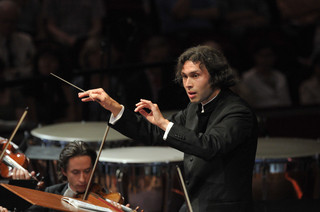|
Back
A Pair of Fantasy Debuts New York
Avery Fisher Hall, Lincoln Center
05/21/2014 - & May 22, 23, 24*, 2014
Karol Szymanowski: Violin Concerto No. 1, Opus 35
Serge Prokofiev: Zolushka: Selections from the three suites arranged by V. Jurowski, opus 107, 108 & 109
Nicola Benedetti (Violin)
New York Philharmonic Orchestra, Vladimir Jurowski (Conductor)

N. Benedetti (© www.nicolabendeti.com)
To make one’s New York Philharmonic debut with a violin concerto by Karol Szymanowski might be considered mad by some. The Polish composer is only now becoming mainstream, and even here, audiences might not understand all the rivulets, tides and waves of that main stream. Szymanowski was mystic and aristocrat, a daring technician, an international celebrity in his time, a fervent homosexual who set music to poems about beautiful boys, and a folklorist of the Carpathian mountains.
Not even this First Violin Concerto has its predecessors in the concerto genre. Almost 30 minutes of uninterrupted playing, few themes upon which one can hang one’s mental hat, and orchestral magic which darts back to Rinsky-Korsakov and Scriabin.
But Nicola Benedetti, a Scotswoman who has won her share of prizes around Europe, is a rare hand with this piece. Not only had she performed this ten years ago, garnering her Young Musician of the Year, but she recorded the piece with Daniel Harding.
Actually, Ms. Benedetti wasn’t supposed to perform it with the Phil this week. The Dutch violinist Janine Jansen was set to play it, until her doctor told her she needed rest. Enter the 26-year-old Ms. Benedetti, who obviously knew how to make ravishing music out of an inspired but tangled collection of themes, half-themes and orchestral filigrees.
The changes of orchestral mood are endless, but they roll around treble notes (the first ten minutes is way up on the scale), Ms. Benedetti’s violin soaring above the flutes, the strings on the high end of the fingerboard, the winds in the most searing ranges. If Szymanowski was never one for orthodox structure, he painted his picture with glowing tones, and the violin was among the most colorful.
The work itself, written in 1916, came in the midst of music that would encompass the entire 20th Century, but this Concerto didn’t need either Schoenberg or Stravinsky as talisman. The orchestral effects, seemingly stemming the latter, was closer to Rimsky’s color, and the long lines might be considered Impresisonistic. Mr. Benedetti had no trouble whatsoever with essaying it, making it live. And the long cadenza was played with a tough, trouble-free vivacity.

V. Jurowski (© Chris Christodolou/IMG Artists)
In Vladimir Jurowski, she had a most sympathetic conductor. Russian-born, German-educated, today the conductor of several British orchestras, Mr. Jurowski was also making his debut with the Phil–and this was most surprising, since he has been on the Lincoln Center and Carnegie Hall podiums several times.
Mr. Jurowski has a reputation of being “fiery” but that never would describe his magnificent orchestral painting. And this could hardly be bettered than the second-part offering, an hour of Serge Prokofiev’s Cinderella.
The composer had taken the original ballet, cut it down to three orchestral suites, re-orchestrating it for the concert hall. Mr. Jurowski, not satisfied with that, and evidently wishing to give more play to a work which musically rivals Romeo and Juliet, blended the three suites, put them in the order of the ballet story, and gave us an hour of grand waltzes, galops, and satire. There were moments when the soloists outdid themselves. I had heard Michelle Kim the night before with Yefim Bronfman. Last night, she played the catty duet with Concertmaster Sheryl Staples. The low winds and brass gave the mordant bass to those wickedly aristocratic dances. And the simplicity of the story was told with about 20 vignettes.
Neither work on the program took a cue from real emotions, real feelings. Yet one can easily put up with an evening of fantastic fantasy and the grandest of grand illusions.
Harry Rolnick
|